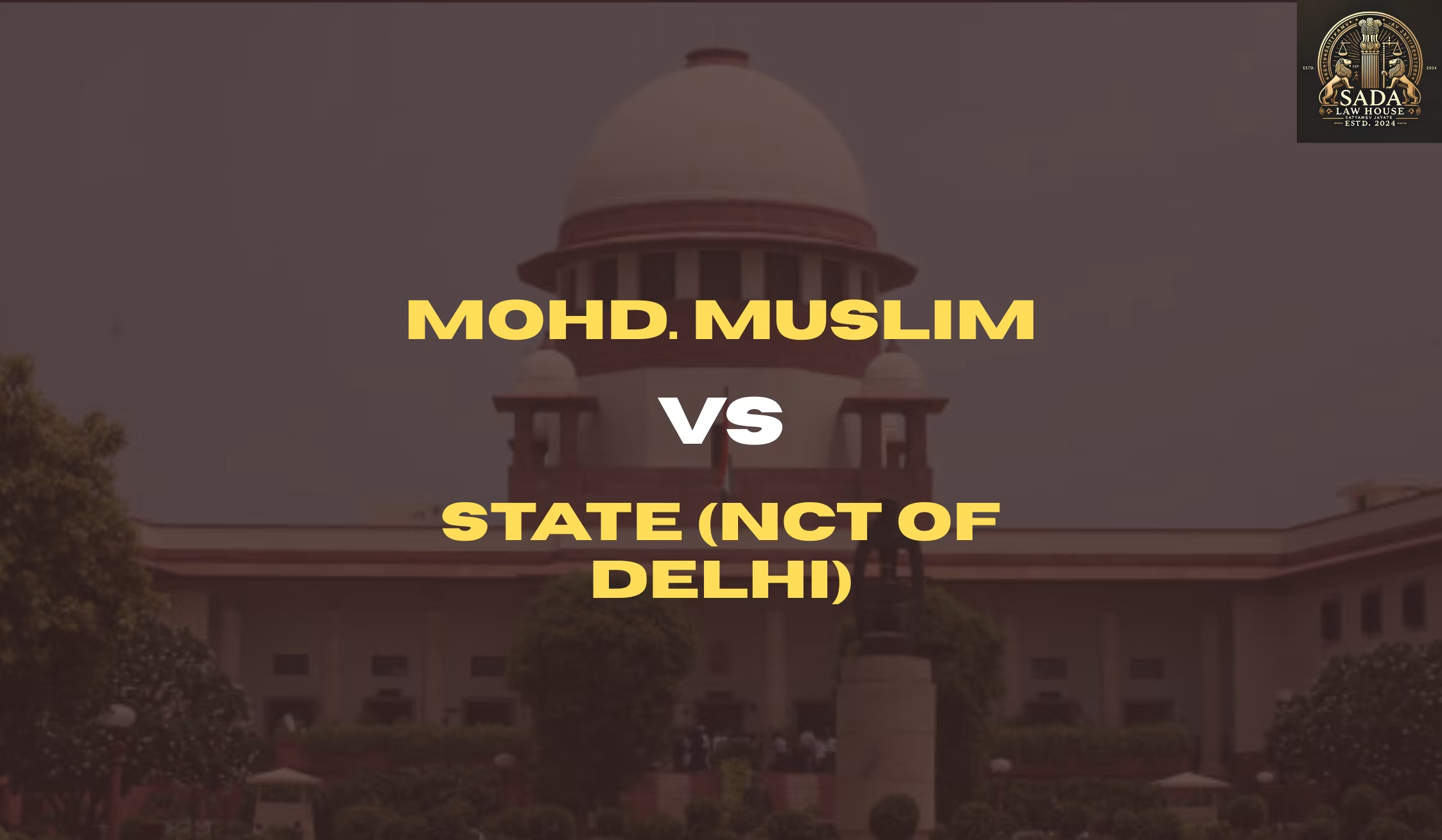Supreme Court Grants Bail Despite NDPS Act Section 37: Upholds Article 21 in Mohd. Muslim v. State (NCT of Delhi)
- NITU KUMARI
- 19 June 2025

In Mohd. Muslim v. State (NCT of Delhi), the Supreme Court of India ruled that prolonged pre-trial detention under the NDPS Act violates Article 21 of the Constitution of India. Learn how this landmark 2023 judgment balanced personal liberty with statutory bail restrictions.
Introduction – Liberty vs. Law in NDPS Bail Cases
In a landmark 2023 decision, the Supreme Court of India addressed the critical issue of prolonged incarceration of an undertrial under the Narcotic Drugs and Psychotropic Substances Act, 1985 (NDPS Act). The petitioner, Mohd. Muslim, had been held in pre-trial custody for over seven years without trial completion.
This case raised urgent constitutional concerns about Article 21—which guarantees personal liberty and the right to a speedy trial. The Court emphasized that Section 37 of the NDPS Act, which imposes stringent bail restrictions, cannot be interpreted so rigidly as to violate these fundamental rights.
Background and Facts of the Case
Arrest and Charges Under NDPS Act
In 2015, Mohd. Muslim was arrested for alleged possession and trafficking of a commercial quantity of narcotic substances, a serious offence under the NDPS Act. He remained in custody for over seven years, during which the trial saw minimal progress, with several prosecution witnesses yet to be examined.
Despite multiple bail applications, the courts consistently rejected his pleas, citing the strict conditions under Section 37 of the NDPS Act, which heavily restrict bail for such offences.
Legal Issue Before the Supreme Court
The core issue was:
Does prolonged pre-trial incarceration under Section 37 of the NDPS Act violate Article 21, and should bail be granted when trials are indefinitely delayed?
The petitioner argued that his right to liberty and presumption of innocence had been infringed due to the lack of trial progress, while the State emphasized the seriousness of narcotic offences and the strict statutory bar on bail.
Petitioner’s Arguments – Liberty Must Prevail
The petitioner contended:
Seven years in custody without conviction violated his right to a speedy trial under Article 21.
The presumption of innocence must not be defeated by indefinite detention.
Section 37’s bail restrictions cannot override constitutional protections.
Previous Supreme Court rulings recognize trial delays as valid grounds for bail.
Respondent’s Arguments – Public Interest and Statutory Limits
The State (NCT of Delhi) argued:
The case involved a serious narcotics offence, justifying strict scrutiny.
Section 37 of the NDPS Act clearly restricts bail unless the accused is deemed not guilty and unlikely to reoffend.
While there were delays, they were procedural and case-specific.
Granting bail could weaken the NDPS Act’s deterrent effect.
Supreme Court’s Judgment – Bail Granted in the Interest of Justice
The Supreme Court, led by Justice S. Ravindra Bhat, granted bail and made the following key observations:
Prolonged incarceration without trial violates Article 21.
The stringency of Section 37 does not override constitutional safeguards.
Courts must prioritize liberty when systemic delays prevent fair trial timelines.
The judgment stated:
“Deprivation of liberty for a single day is one too many… Prolonged incarceration without trial is a travesty of justice.”
The Court ruled that bail must be granted when an undertrial has spent more time in custody than many convicts, without any meaningful progress in their case.
Conclusion – A Landmark on Bail and Constitutional Rights
This judgment in Mohd. Muslim v. State (NCT of Delhi) is a critical precedent that reaffirms the primacy of personal liberty and fair trial under Article 21. It signals a more humane and constitutionally balanced approach to bail decisions under special criminal laws like the NDPS Act.
While recognizing the seriousness of drug offences, the Court made it clear: No statute can justify indefinite pre-trial incarceration. The ruling strengthens the constitutional commitment to justice, liberty, and the presumption of innocence.
H2: Key Takeaways for Legal and Constitutional Law
NDPS Act Section 37 is not absolute; constitutional rights prevail.
Trial delays are a legitimate ground for bail, even in serious offences.
Pre-trial detention beyond a reasonable period is unconstitutional.
The judgment reinforces the importance of balancing security with liberty.
Case Laws






